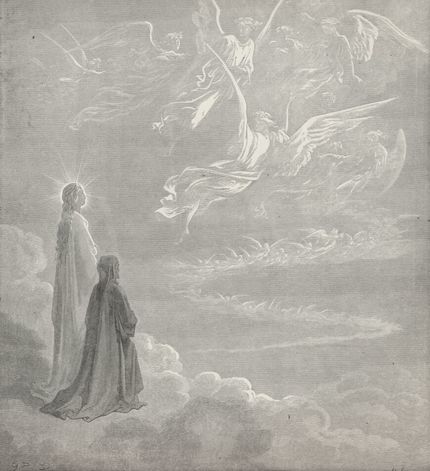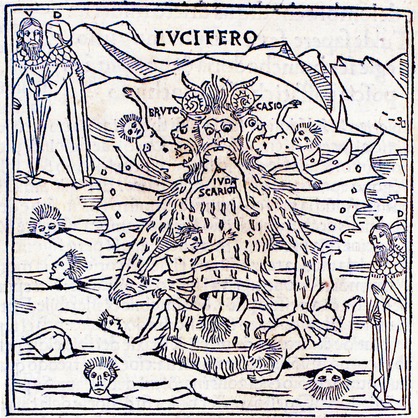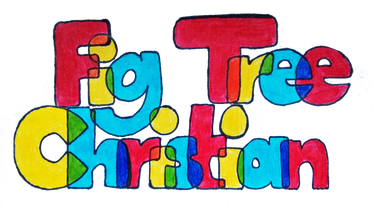|
-Rev Melissa Fain- I'll be the first to say this subject makes me uncomfortable. I'm a monotheist. That means I believe there is one God. I cannot wrap my head around angels and demons and keep a monotheistic view on God. I know some of you might try to push back that angels and demons are not called "gods," they are called angels and demons, or some level above human, but that's a semantics game. By any other faith tradition angels and demons would be considers lesser gods in a pantheon of divine beings. In my mind, (and this is my belief, so don't feel like you have to follow it) either demons and angels are an image of God, and part of the many in one, or we are a polytheistic (we believe in many gods) faith, or angels and demons don't exist. These are the only three options I personally have to understand this topic. That's my grain of salt before I jump into the text. So, let's begin! Today's understanding of Angels and Demons might look something like this: Angels: Good Demons: Bad The Ancient Near-east perspective was less stark. Demons could be good, and angels could be bad. In fact, women of the Ancient Near-east had a fear of angels, because the cultural understanding believed they often came with bad news or actions. (Something to consider as we move into Advent, and read about Mary and Gabriel.) Demons had a similar vague purpose. There's a theory that the Persians moved the theological spectrum over to complete evil for the Israelite's belief of demons. Really, any sort of demonic understanding didn't really form until they came back to Israel from their exile in Babylon. I find this extremely interesting because pre-exile we have a people concerned with how God acts in the world. Post-exile, we have a people concerned with how evil manipulates the world. Considering the Babylonian exile was a time they felt separate from God (God lived in the temple, and the temple was in Jerusalem) I can see how their focus would drastically change. What are they?Whether we are talking about demons or angels, their appearance is vague. This shouldn't be surprising, because with few exceptions we don't get good descriptions of any biblical character. Cherubs, which are also vague but because of the numerous contradictory descriptions, are usually winged. This is probably where we got the idea that angels have wings. (Although there is nothing biblical saying cherubs are angels.) The pitchforks shown in the devil's hand might actually draw to the flesh hooks used by priests for sacrifices, as both have three prongs. Also, like I mentioned in previous posts, the goat like look of devils might go back to the scapegoat and Azazel. So, biblically, what do they do? Angels are primarily messengers. There is an "Angel of the Lord" specifically called to prepare the appearance of God. Therefore, it's always to bring really good or really bad news. Angels can also praise, and watch over creation. If you're an angel named Michael, you can also kick some butt and take some names while you're at it. Demons are a bit more illusive. It seems anything bad can and would be blamed on the demonic. Evil spirits: demons. Minions of Satan: demons. Evil in the world: demons. Mental illness: demons. Natural disasters: demons. All the front parking spaces unavailable: demons. I'm joking about that last one, but you get the idea. As our scientific knowledge has grown, our belief that demons are to blame decreased. Like most of humanity would not blame mental illness on demons. Most would see mental illness from a much more sympathetic slant. We also have a different view of natural disasters, as in some cases humanity's actions are partly to blame. In fact, the real demons might just be in the mirror, as we are capable of great damage to one another and the world. No matter what we think about demons, there are new testament scriptures of Jesus casting them out. I take that to mean no matter what form, we turn to God to destroy the evil in our hearts. Maybe that's an actual evil spirit, or maybe that's the evil that naturally exists in our heart. Either way, we should always turn to God. Well, that's what I got. What about you? Wanna expand the definition? Do you believe in demons and angels? Why or why not? Leave a comment and let's talk! We will be at The Daily Grind this Sunday at 2pm for our livecast! We would love to see you. If you can't be there in person, show up online on our Facebook page.
Connect with us in other ways too! Check out our tweets @FigTreeTweet, and visit our subreddit at /r/FigTreeChristian! -Rev. Melissa Fain- :Perhaps you've been watching your favorite sexy devil in Lucifer, or maybe you are more old school, like me, and take a page (literally if you look above) from Dante's inferno. Either way, we all have an image that comes to mind when we think of what the devil is supposed to look like. It seems our imaginations go all over the place when we try to picture an adversary to God. I used to have nightmares about Tim Curry's adaptation in Legend. Meanwhile, George Burns' doppelganger in the Oh God franchise made me laugh. Yet are any of these images biblical? Many have heard the phrase: "The biggest trick the devil ever played was convincing the world he didn't exist."Or, how about this one: "The devil made me do it."I hate these phrases because they take away personal accountability. It's too easy to just blame everything on the devil and never take responsibility for the sins of the self. It's dangerous, but what I find even more dangerous is our instance to believe the "Lucifer" story at all. Now, before I continue, I'm being very specific about the titles. I've talked numerous times about Satan. Legally Speaking, being the most widely read. I've also talked about Azazel and the Scapegoat a couple of times. Most recently being last week. Yet, until today, I've never ever mentioned Lucifer. Why? That answer is multifaceted:
Look, while I am suggesting Lucifer is not a fallen angel, I'm not suggesting evil doesn't exist. Evil is real, and lives in all of us. We can't help it. Anyone who suggests they are as pure as the driven snow is lying. We all fall short of the glory of God. All means all. We should be wary of the devil within us. We are all fallen stars. I want us to see the darkness within ourselves, so we can better care for the light that also resides within us all. We will be at The Daily Grind this Sunday at 2pm for our livecast! We would love to see you. If you can't be there in person, show up online on our Facebook page.
1 And Jesus went to the Mount of Olives. 2 Early in the morning he returned to the temple. All the people gathered around him, and he sat down and taught them. 3 The legal experts and Pharisees brought a woman caught in adultery. Placing her in the center of the group, 4 they said to Jesus, “Teacher, this woman was caught in the act of committing adultery. 5 In the Law, Moses commanded us to stone women like this. What do you say?” 6 They said this to test him, because they wanted a reason to bring an accusation against him. Jesus bent down and wrote on the ground with his finger. 7 They continued to question him, so he stood up and replied, “Whoever hasn’t sinned should throw the first stone.” 8 Bending down again, he wrote on the ground. 9 Those who heard him went away, one by one, beginning with the elders. Finally, only Jesus and the woman were left in the middle of the crowd. 10 Jesus stood up and said to her, “Woman, where are they? Is there no one to condemn you?” 11 She said, “No one, sir.” Jesus said, “Neither do I condemn you. Go, and from now on, don’t sin anymore.” John 8:1-11 CEB -Rev. Melissa Fain- It's a story that retells itself over and over again. Sometimes it within a small group, and the consequence is a specific person is ostracized. Sometimes a whole people are chosen, and an entire nation sends them to their deaths. It is the cost of our communal sin. Let me simplify. We become so disconnected as a community we reconnect with the worst thing possible: A scapegoat. It is easier to choose someone to hate, than it is to discover how our enemy might actually be a friend. The Israelites literally did this with a goat. They prepared two goats. One goat was sacrificed to the Lord. The other symbolically had all the sin of the people placed upon it, and released into the wilderness for Azazel. This didn't start as a specific name for Devil. It started as a word, which hear means "to completely remove." That was what scapegoating was. It simply removed the sin of the people. Now, scapegoat means a person or animal which takes on the sins of others, or is unfairly blamed for problems. What does this have to do with "casting the first stone?" Everything. History repeats itself. When a community first forms, we are drawn together by the simple excitement of the newness. People come for the purpose, and that pulls them to one another. Then something inevitably happens. We begin defining the new group. At first this just creates sects within the group where two people have conflicting views. These views put them in different groups within the larger group, but they are still part of the larger group. Inevitably these sects become more important than the larger group. That's when we begin to separate, no longer knowing people who don't share our specific ideology. This is how America was right before the World Wars. It was only after the soldiers came home, really wanting to reconnect, that we began piecing our society back together. That disconnect is how we are today. It was how the world was during Jesus' time. There comes a point where a group or society needs glue. Sometimes a leader can step up, someone who can see both sides. This person can bridge the divide between this sects. More often times than not, we find our glue in putting our differences on a scapegoat. Then we do that again and again until we realize how horrific our actions are. We don't know what Jesus wrote in the sand. We do know this woman was guilty. Even though Jesus would ultimately and freely become the biggest scapegoat of them all, on this day he was the glue to keep someone else from the same fate. Here's the question I want to leave you with: Are we about to sacrifice our scapegoat(s), or are we looking for someone who will glue us back together? We will be at The Daily Grind this Sunday at 2pm for our livecast! We would love to see you. If you can't be there in person, show up online on our Facebook page.
34 “Jerusalem, Jerusalem, you who kill the prophets and stone those who were sent to you! How often I have wanted to gather your people just as a hen gathers her chicks under her wings. But you didn’t want that. 35 Look, your house is abandoned. I tell you, you won’t see me until the time comes when you say, Blessings on the one who comes in the Lord’s name.” Luke 13:34-35 CEB -Rev. Melissa Fain- It was my favorite scene from Minority Report. John Anderton, played by Tom Cruise, stole a pre-cog in order to prove his innocence. We discover, as the movie plays out, someone killed his son before the time of pre-cogs and he never discovered who. Hiding out in his son's old room at his old lakeside house, the pre-cog begins to tell the story of John's son, a story where he grew up and became a man. It wasn't real. It was a mirage. A beautiful story, but still just a story. John's son still died as a boy, and nothing could change that. Recently I've noticed a growing trend among Christians. Either there is this nostalgia surrounding what could have been, or there is something disconnected about the planning. Big plans are made, and the end result is nothing. What went wrong? Well, I can speak from experience, because I've been there. You get this call, and then something sneaks in: ideas. You start planning how it's going to turn out. You start envisioning some epic event. Perhaps, like me, you were starting a church or a worship event, and you expected to pack the house. Then no one shows up. (What I just described was my first launch and someone else's worship. Both had the same results.) Basically, we begin to follow mirages. Oh they look so inviting, and the image looked like it could quench our spiritual thirst, but all that is waiting at the other side is more dry land. How does this happen? Well, in the case of calls, we get impatient. God gives us a seed, and we began to imagine the possibilities. Then, instead of realizing we are just excited about what the seed could possibly turn into, we try to force it into our vision instead of waiting for God's timing. In the case of nostalgia, we fail to see how a call has died, and we try to follow a "pre-cog" false reality." It's beautiful to see what could have been, but it could never be, because the call is already dead. I believe Jesus had them too. That's what we are hearing when we read him wanting to gather the people like a hen gather's her chicks. That's a beautiful picture of reconciliation. I too, wish it were real. It wasn't. The living call of Jesus was to prepare Disciples to become Apostles after his death. If he had lived into the mirage of reconciliation, the Disciples wouldn't have been prepared to rise up after Jesus was gone, and the death of Jesus would have still happened. What's the point? We, and that includes me, has to let go and trust God. There was a time I had this grand vision, but it was my vision. I filled in gaps where all I was called to do was wait. I followed the mirage, when I was supposed to be following the call. That's a tough lesson to learn, especially when you get to the mirage and find there is nothing there. All one can do is pick up the pieces and start going in the right direction again. Oh, and don't be discouraged at reaching a mirage. If even Christ saw them, we shouldn't be dismayed that we followed one for a short period. Our purpose at that point is simply to get back on track. We can't change what has happened, but we have power and action now. It's our job to be the best we can within our fallen state. Forgive yourself, as God forgives you, and move on. We will be at The Daily Grind this Sunday at 2pm for our livecast! We would love to see you. If you can't be there in person, show up online on our Facebook page.
"[T]o vote or use the civil power is to use force and carnal weapons. Christians cannot use these. To do so is to do evil that good may come. This is specially forbidden to Christians. To do so is to fight God’s battles with the weapons of the evil one. To do so is to distrust God. The effective way for Christians to promote morality in a community, is, to stand aloof from the political strifes and conflicts, and maintain a pure and true faith in God, which is the only basis of true morality, and is as a leaven in society, to keep alive an active sense of right. To go into political strife is to admit the leaven of evil into the church." David Lipscomb, from the Church of Christ, on Voting -Rev. Melissa Fain- I, Melissa Fain, of sound mind and body, fully believe this is my one and only political post. If anyone plans to ask my opinion on [insert current election here], I will point them to this post as my only public opinion on the subject. To sum up my opinion, nothing good can come from publicly expressing where I am casting my vote. David Lipscomb, a person within the Campbell-Stone tradition thought this meant not to vote at all. I disagree, but agree with his reasoning. Let me expand below: My job, as a minister, is two-fold. First, I'm called to be a shepherd to a flock. Politically speaking, we are split fairly evenly as a country. Voting is something our country is strongly convicted about. We get up in arms about those people we are voting for. If I were to stand for one representative over another, I wouldn't really change anyone's mind, and all I would do is ostracize half my flock. Secondly, I am called to educate God's Word in the world today. Now, there are ministers who believe that a certain political ideology somehow best describes biblical points of view. (And yes, multiple sides do it.) I don't. I disagree so strongly, I refused to endorse a congressman within my own congregation. I'll basically tell you what I told him: " I don't believe in endorsing anyone because I don't want a person to vote for someone because I said I was voting for that person."While choosing your candidate based on your faith leader's preference is lazy, I also believe it abuses the power of the pulpit. Now, I know how offensive that could be, especially for my ordained brothers and sisters who feel an obligation to speak their political choice. The pulpit, or in my case the internet, is a very strong megaphone. In ordination it is a burden we must wear. It can be used for great good, and it can be used for great evil. We must speak the truth, and only the truth. Anything else tarnishes our call to God. This truth must be spoken at all costs, no matter what the costs. Those truths might help someone vote, but that will be their choice, not mine. Now to get to the above quote. Is voting a weapon? I see voting much like a see knives. I use knives, and often. I use knives in cooking to cut up food. I use knives as a den leader to teach the boys life skills. I'm a very crafty person and will use knives to help make costume pieces, or something for a birthday party. Knives have a time and a place. They are tools, and sadly they are weapons. Like knives, there is a time and a place for politics. Politics can be a useful tool, but in the wrong arena it can become a weapon. Politics in church is a great example of a weaponized tool. It splits the flock, weakens the choice of the voter, and misuses the pulpit. So vote, just don't ask me who I'm voting for. That tool will not be entering this church. We will be at The Daily Grind this Sunday at 2pm for our livecast! We would love to see you. If you can't be there in person, show up online on our Facebook page.
|
Categories
All
Archives
October 2023
|







 RSS Feed
RSS Feed